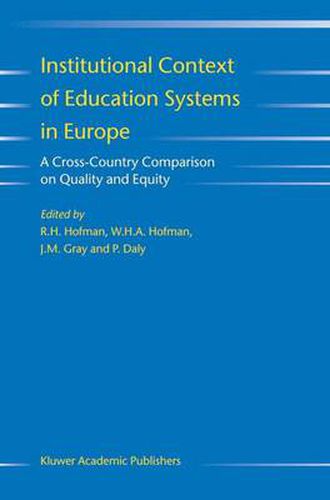Readings Newsletter
Become a Readings Member to make your shopping experience even easier.
Sign in or sign up for free!
You’re not far away from qualifying for FREE standard shipping within Australia
You’ve qualified for FREE standard shipping within Australia
The cart is loading…






This title is printed to order. This book may have been self-published. If so, we cannot guarantee the quality of the content. In the main most books will have gone through the editing process however some may not. We therefore suggest that you be aware of this before ordering this book. If in doubt check either the author or publisher’s details as we are unable to accept any returns unless they are faulty. Please contact us if you have any questions.
Based on empirical analysis using configuration theory and multi-dimensional scaling, this book provides insight into types of relationships that can be found between groups of countries with certain institutional context features, and into the quality and equity of their education system.
In this volume, the authors take up the challenge of considering what a European ‘settlement’ might look like. In doing so, they take into account worldwide trends and the increasing evidence of convergence across educational systems. The outcomes of comparative analyses seem to suggest that strong education systems in terms of finance, governance and choice could be preferable. To a greater or lesser extent, therefore, all the systems of education currently in use in Europe face some common challenges. The way in which these challenges are addressed will determine the future of these systems. Key elements in the current debate that are considered in greater detail in this volume include changing views on (a) centre-local relations with signs of an increasing commitment to decentralisation as a guiding principle for developing school governance; (b) school autonomy which is now increasingly regarded as the engine-room for school improvement, especially in relation to sustaining it; and © the celebration of community and school choice as a means of securing higher levels of parental involvement.
This volume will be of interest to researchers and practitioners working in education, educational research and sociology of education. It will also be of relevance to those interested in the comparison of various education systems and in governance, funding of education and school choice.
$9.00 standard shipping within Australia
FREE standard shipping within Australia for orders over $100.00
Express & International shipping calculated at checkout
This title is printed to order. This book may have been self-published. If so, we cannot guarantee the quality of the content. In the main most books will have gone through the editing process however some may not. We therefore suggest that you be aware of this before ordering this book. If in doubt check either the author or publisher’s details as we are unable to accept any returns unless they are faulty. Please contact us if you have any questions.
Based on empirical analysis using configuration theory and multi-dimensional scaling, this book provides insight into types of relationships that can be found between groups of countries with certain institutional context features, and into the quality and equity of their education system.
In this volume, the authors take up the challenge of considering what a European ‘settlement’ might look like. In doing so, they take into account worldwide trends and the increasing evidence of convergence across educational systems. The outcomes of comparative analyses seem to suggest that strong education systems in terms of finance, governance and choice could be preferable. To a greater or lesser extent, therefore, all the systems of education currently in use in Europe face some common challenges. The way in which these challenges are addressed will determine the future of these systems. Key elements in the current debate that are considered in greater detail in this volume include changing views on (a) centre-local relations with signs of an increasing commitment to decentralisation as a guiding principle for developing school governance; (b) school autonomy which is now increasingly regarded as the engine-room for school improvement, especially in relation to sustaining it; and © the celebration of community and school choice as a means of securing higher levels of parental involvement.
This volume will be of interest to researchers and practitioners working in education, educational research and sociology of education. It will also be of relevance to those interested in the comparison of various education systems and in governance, funding of education and school choice.